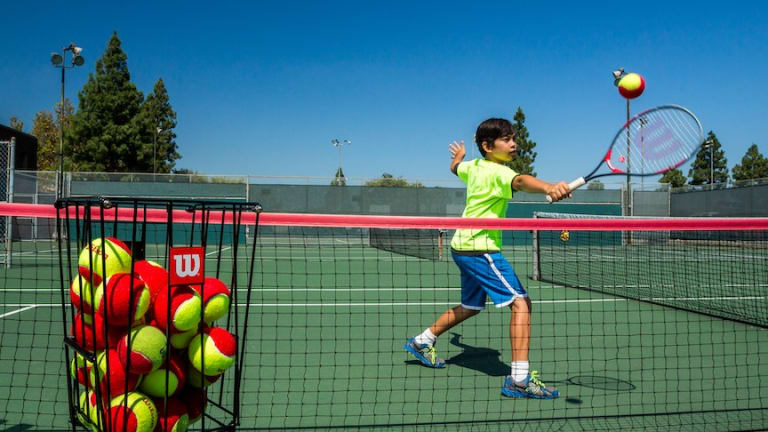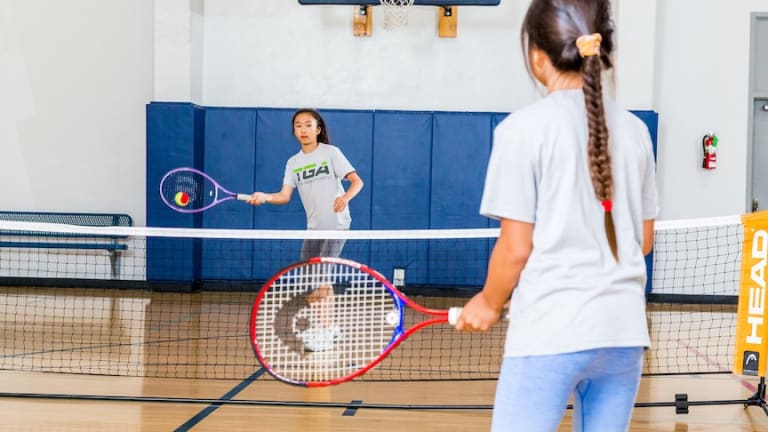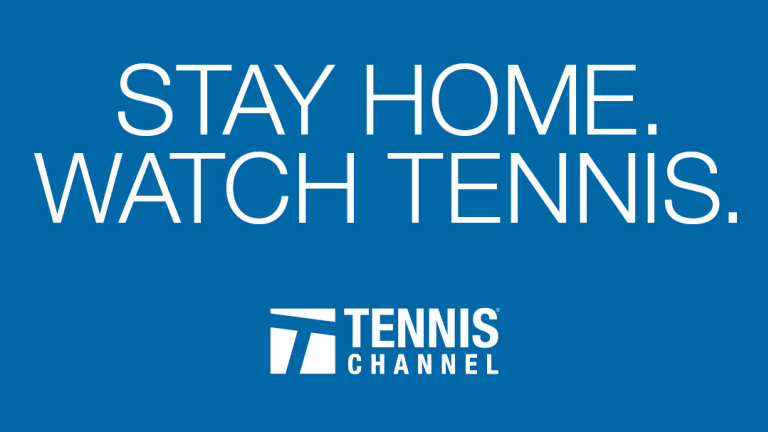TGA's Joshua Jacobs on confronting the COVID-19 crisis directly
By Steve Flink Apr 26, 2020San Diego Open
ATP cancels China swing, including Shanghai Masters, and adds six 250 events to 2022 calendar
By TENNIS.com Jul 21, 2022Australian Open
Pandemic surge hits Australian Open: Bernard Tomic's COVID-19 prediction comes true, spectators capped at 50 percent
By Kamakshi Tandon Jan 13, 2022Australian Open
Novak Djokovic has been exempted—but his stance hasn’t been vindicated
By Steve Tignor Jan 04, 2022Australian Open
Rafael Nadal back on track for Australian Open following COVID-19 case
By Kamakshi Tandon Dec 30, 2021Australian Open
Aussie Open field starts to experience effects of pandemic surge, vaccination issues
By Kamakshi Tandon Dec 21, 2021"It will happen this year": Stefanos Tsitsipas planning to get COVID-19 vaccine
By Kamakshi Tandon Sep 21, 2021US Open
Going to the US Open? Proof of vaccination status now required after change in COVID-19 policies
By TENNIS.com Aug 27, 2021US Open
A vaccinated Sofia Kenin to miss 2021 US Open due to positive COVID-19 test
By Matt Fitzgerald Aug 26, 2021Australian Open
The Rally: if you wanna play a major, you must play by the local rules
Jan 18, 2021TGA's Joshua Jacobs on confronting the COVID-19 crisis directly
Without minimizing what his company is up against during a worldwide pandemic, Jacobs believes TGA can deal with this dilemma productively. "Kids programs thrive because parents are always going to spend on their kids before spending on themselves."
Published Apr 26, 2020
Advertising
Those who are familiar with Joshua Jacobs will tell you unhesitatingly that the primary reason this remarkable CEO has succeeded so sweepingly with Teach, Grow, Achieve (TGA) Premier Sports is because he has always been a leader with a nimble mind and extraordinary clarity of vision.
Jacobs founded TGA in 2003, initially landing in 12 Los Angeles elementary schools and creating the first after-school golf enrichment curriculum of its kind. Three years later, he expanded its platform, establishing the sport’s first franchise company specializing in golf.
In 2012, the USTA asked Jacobs to develop the same franchise model for tennis as he had done for golf. And then, three years ago, he added six more sports to the TGA stable, including flag football, lacrosse and volleyball. Now, TGA is highly regarded as the “go-to-brand” for introductory sports and is the acknowledged leader as the country’s largest provider of school and community based youth sports enrichment programs across the nation.
But the world has been turned upside down over the last five or six weeks, and Jacobs is confronting the COVID-19 crisis just like everyone else in the business world.
Even for the enterprising Jacobs, this is a singularly challenging time trying to sustain the excellence of his operation. And yet, without minimizing what he is up against during a worldwide pandemic, he believes TGA can deal with this dilemma productively and turn it in some ways to their advantage.
“When the unemployment rate is up, it is easier for us to find part time coaches that teach the programs we run, and that gives us the opportunity to create new programs and introduce new players into the sport and retain them,” Jacobs told tennis.com. “That is the bottom line for us. We were not in the tennis industry until 2012, but TGA sold more golf franchises between 2008 and 2012 than we did between 2012 and 2020 in an up economy.
“The two industries that do really well in a down economy are alcohol and kids programs. Kids programs thrive because parents are always going to spend on their kids before spending on themselves. This really bodes well for TGA’s expansion.”

TGA's Joshua Jacobs on confronting the COVID-19 crisis directly
Advertising
TGA
He expands on his theme.
“I think tennis is going to be really positively impacted at the end of all this with the pandemic. It is well positioned to grow,” he said. “It is a small team sport for doubles or an individualistic sport. It can be played indoors or outdoors in a space that is not confined. We can also engage the youth through online applications—at home or in a classroom setting—that builds a tennis community of youth players.
“If you can activate the adults, that is really the missing puzzle in the tennis world. Look at the TIA numbers of the industry and the gap is in the 25 to 45 age group. But if you have the kids and are moving toward more family opportunities, you can engage the whole family and have the ability to impact the entire industry.”
He was philosophical about how deep the impact of the coronavirus might weigh on his business model.
“The tennis industry much more than the golf industry has a lot more small businesses. Right now it is about how you are going to survive,” he assessed. “The virus is forcing us to think ahead and foresee what is going to be needed. In the U.S. we are a pretty resilient country, but the immediate item on our list is creating new contents. Our customers are asking us to create online tennis programs for schools and potentially for our summer camps if they can’t run, so we are just trying to utilize our resources.
“One of the main ways we are doing this is through creating those online opportunities with our student handbooks geared more toward the introductory skill level. We are creating an avenue into tennis for kids and families who either don’t play or may be looking for something new to do at home to keep them active.”
Jacobs has the drive and the imagination to find a multitude of ways to operate during this complicated period when large groups of people are unable to assemble the way they once did.
“The first thing that we have had to do is say, ‘Look, how are we going to stay in business? How are we going to survive? Where do we put our resources? And what are our opportunities on the back end?’

TGA's Joshua Jacobs on confronting the COVID-19 crisis directly
Advertising
TGA
I see opportunities,” he said. “The first one I can reaffirm is having more online content for both youth and adults. The second thing is we will have a big opportunity with how we are positioned in tennis when we come out of the pandemic. People are going to want more programs and tennis is an appealing option for adults. This will give us the ability to expand our program offerings.”
Where is TGA in their process of developing a new game plan so suit this unique set of circumstances?
“We are about 50% into this process,” Jacobs said. “One of the big things we are waiting for is whether or not we can run summer camps. I have a feeling we will know that in the next four to six weeks.”
He has looked at a possible scenario that the TGA summer camps do not happen.
“It is like the industry mapping out losing their summer season,” he said. “I have heard about all the salary cuts at USTA. I am sure they are mapping out what is going to happen if the US Open doesn’t run. So for us, No. 1 is about helping our franchises survive. We are making concessions on their royalties and deferring all worldly payments until they are able to physically run programs.
“No. 2 is we are creating online content and a potential membership opportunity online for our families to participate at a very nominal cost. And No. 3: I truly hope the tennis world has the ability to run tennis programs by the fall and if that happens our franchises will be well positioned.”
September is more than four months away. But what if TGA and others can’t run programs even then?
“To be honest I haven’t looked that far ahead yet. We are looking a scenarios if summer programs don’t run but we have not modeled out what it would look like if fall didn’t run,” he said. “If clubs and parks and recreational couldn’t run tennis until 2021, how many businesses do you think would close? I mean, if that happened it could have a profound impact on the tennis industry.”
Much of the industry is deeply affected by the USTA and how they wield both their financial power and exert their overwhelming importance as the governing body of tennis in the United States. The USTA announced that they will spend $50 million to support the sport’s ecosystem over a multi-year and multi-phased plan. No one knows how much their support will specifically benefit TGA or anyone else, but Jacobs lauds the organization for their decision.
“With the right positioning and infrastructure to receive increased consumer demand across all demographics, the tennis industry has the ability to thrive in the new reality,” he said. “The sacrifices USTA National and USTA Section staff are making for the industry and the Professionals is a testament to their long term vision and passion to strengthen the sport. Prior to COVID-19, tennis participation was in a steady decline and the new reality will bring an opportunity for the USTA to redefine the U.S. ecosystem.”

TGA's Joshua Jacobs on confronting the COVID-19 crisis directly
Advertising
TGA
Having said that with sincerity, Jacobs is constructively critical of the USTA in other respects, as he told me a few days before praising the USTA for their new $50 million plan.
“The USTA could be better served as a facilitator on bringing local grassroots programs and also community center locations together to drive youth tennis players and adults through a player pathway that engages them with the USTA....,” Jacobs said. “For decades the USTA has deployed similar marketing campaigns and curriculum without addressing a cohesive delivery system to current and non-tennis players. In my opinion, this undermines any quality or metric control that can be achieved as an industry.”
He still believes that there will be significant opportunities ahead for both TGA and the USTA.
“Adversity brings hopefully a lot of opportunities and this is going to be an opportunity for USTA National to come out as heroes and collaborate with grassroots programs like ours at TGA to create and retain new players,” he said. “This is the lifeline of the industry and if you increase the lifeline you increase the bottom of the pyramid—the introductory programs for kids and adults.”
The USTA is central in the shaping of the industry, but not the sole player. Jacobs wants to make certain that conceptually he keeps TGA in the forefront as he navigates a health and economic crisis that has engulfed not only his country but the entire world. That means examining best and worst case scenarios for his company.
Jacobs is confident tennis has an edge over other sports that are frozen for the time being.
“I think tennis can emerge quicker. The individualistic sports were shut down last as opposed to the NBA, NHL, etcetera,” he said. “So in a best case scenario, you are looking at a middle to end of June startup with some social distancing and additional rules put in place at tennis facilities.”

TGA's Joshua Jacobs on confronting the COVID-19 crisis directly
Advertising
TGA
He also addresses the flip side of that coin.
“I would say not a worst case scenario but a potential negative scenario for tennis—despite the fact that I believe tennis is well positioned to come out of this for a number of reasons—is the challenge if, economically speaking, the demand rises so much that we don’t have as an industry the infrastructure to support that demand facility wise or professional wise,” he said. “That to me could be detrimental long term to our growth. So we have got a chicken before the egg type situation here and it changes on a daily basis.”
And yet, while Jacobs is not delusional in his assessment of TGA or tennis at large at this crucial historical moment, he is a leader who ultimately refuses to yield to pessimism. In the eye of his mind, he sees a silver lining ahead.
“Parents are itching for their kids to get back to school. Schools want to be up and running. The country wants a sense of normalcy,” he said. “So I look at our ability to rebound from this in a very positive way. Schools need to get started. Kids need to be educated. The crux of our business is as an after school program and at parks and recreation locations and community centers.
“Kids need to be active and they need an outlet after being inside for so long. It is not good enough to be virtual 95% of the time anymore, so I see TGA as an outlet for those two solutions. We have had 285,000 kids go through our program. We are in 54 markets. We are in 2200 facilities. Over the next three to five years, I see us being able to grow by 50% to 100%.”

TGA's Joshua Jacobs on confronting the COVID-19 crisis directly